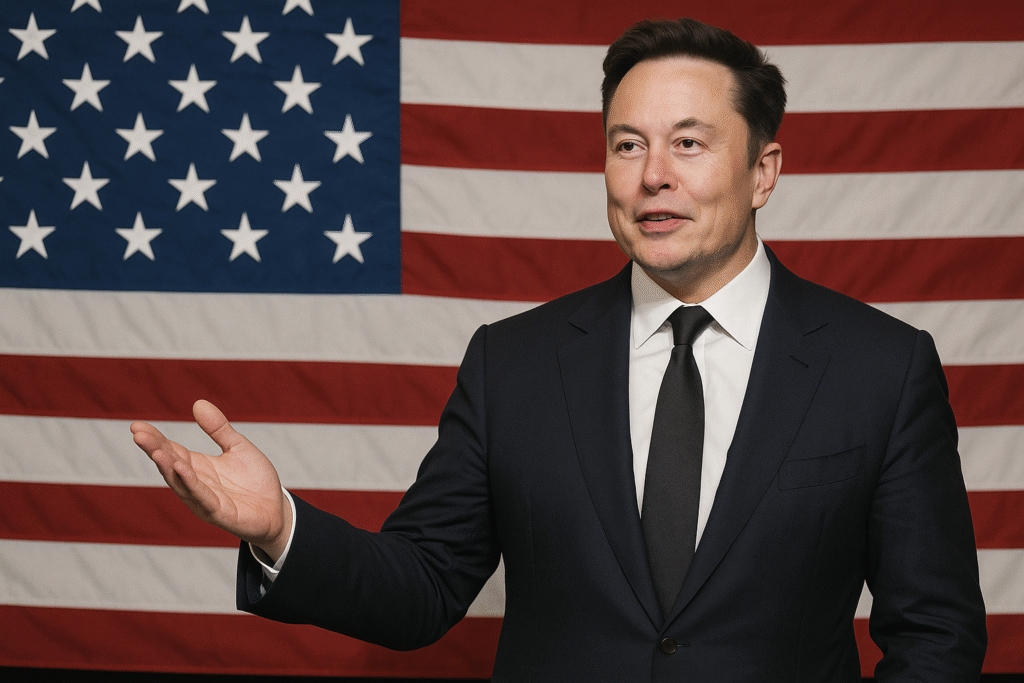📌 Source: CNN Politics, July 5, 2025

Summary
Elon Musk has announced the formation of the America Party, declaring it a necessary response to a “one-party state” driving the U.S. into “bankruptcy.” He aims to win a small number of strategic congressional seats (2–3 in the Senate, 8–10 in the House) to gain veto power over legislation. The accompanying 10-point manifesto calls for “no more censorship,” “maximum transparency,” and a return to “common sense.” What seems at first like an anti-establishment gesture reveals a deeper attempt to reframe political legitimacy in an era of institutional erosion.
Analysis
“The one-party state is leading us to bankruptcy”
→ Gramsci: Passive Revolution & Anti-political Populism
This framing exemplifies what Antonio Gramsci would call a passive revolution — a top-down reorganization of political discourse that absorbs public discontent without transforming power structures. Musk does not propose a new class coalition or ideology; he merely re-labels the bipartisan establishment as a singular, failing “one-party state.” In doing so, he obscures real antagonisms (class, race, gender, economy) and replaces them with a vague anti-institutionalism.
This also mirrors Ernesto Laclau’s notion of empty signifiers in populism: “bankruptcy,” “freedom,” and “truth” become floating terms around which discontent is organized, but whose meanings remain strategically ambiguous.
“We will restore sanity and reason to our national conversation”
→ Mouffe & Rancière: The Erasure of Political Conflict
By invoking “sanity” and “reason,” Musk displaces the field of politics into the realm of technocratic common sense. Here, Chantal Mouffe’s critique of the post-political consensus is vital: when politics is framed as a problem of rationality or efficiency rather than of conflicting values and power, the democratic agon is evacuated.
Similarly, Jacques Rancière would view this as an act of police, not politics — an attempt to reimpose the dominant “distribution of the sensible,” whereby only certain voices, styles, and rationalities are allowed to speak in the name of the public.
Musk does not engage in democratic contestation; he defines dissent as irrationality.
“No more censorship. Maximum free speech.”
→ Foucault & Butler: Language, Power, and the Illusion of Neutrality
While claiming to liberate speech, Musk presents a formalist view of language — as if speech occurs in a vacuum, detached from power, history, and consequence. But as Michel Foucault reminds us, discourse is not merely a conduit of ideas but a site of power relations. Declaring “maximum speech” without conditions or context ignores the ways in which platforms reproduce epistemic asymmetries — who gets heard, who is believed, who is silenced by “freedom.”
Judith Butler’s theory of performative speech also suggests that speech acts are not neutral — they are constitutive of social reality. A politics of “uncensored speech” that ignores this risks re-legitimating violence under the guise of neutrality.
“We’re targeting a few seats to gain veto power”
→ Deleuze & Guattari: Micropolitics and the War Machine
This tactical move reflects a logic described by Deleuze and Guattari in A Thousand Plateaus: the “war machine” does not aim to conquer the state head-on but to operate on its margins, to insert deterritorializing agents that disrupt the centralized control of representation.
Musk’s party doesn’t seek to govern — it seeks to interfere. This is micropolitical power: not the occupation of institutions but their obstruction, jamming the machinery rather than steering it. Yet, as the authors warn, the war machine often becomes captured by the very apparatuses it resists — a fate that may await Musk’s project if it remains structurally ungrounded.
The Metapolitics of Musk: A Post-Ideological Performance?
Taken together, Musk’s rhetoric operates not as a vehicle of ideological contestation but as a simulacrum of politics — a performance of disruption without an alternative horizon. His legitimacy flows from visibility, capital, and technological authorship, not from popular mandate or ethical coherence.
Here, Jean Baudrillard’s theory of simulation becomes instructive: Musk doesn’t offer political content so much as the appearance of political rupture. He simulates dissent while remaining embedded in the very circuits of power he critiques — corporate, financial, digital.
Likewise, Zygmunt Bauman’s notion of “liquid modernity” applies: politics becomes episodic, individualized, and de-institutionalized, consumed more like entertainment than participation.
Reflection
Musk’s America Party should not be underestimated simply because it lacks a traditional program. Its function is not to construct, but to delegitimize — to accelerate distrust in the representational system while posing as its rational corrective.
The deeper question is: What kind of subject does this politics produce? A consumer of soundbites? A networked citizen seeking frictionless disruption? Or an atomized individual, alienated yet attached to charismatic authority?
As Cornelius Castoriadis warned, when societies abandon the project of self-legislation and self-critique, they become vulnerable to the heteronomy of spectacle.
Musk’s project may be less about politics and more about the evacuation of politics — the substitution of visibility for deliberation, presence for representation, and platform authority for democratic agency.

